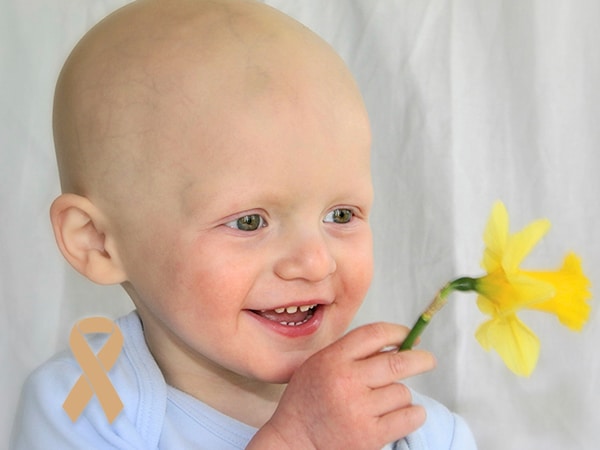September is Childhood Cancer Awareness Month
join with the aacr to find better ways to prevent and treat childhood cancers
These are words a parent never wants to hear: “Your child has cancer.”

In the United States, one in 260 children and adolescents under age 20 will be diagnosed with cancer each year. While relatively rare, pediatric cancers are often devastating. These cancers are the leading cause of death from disease in children and adolescents.
Thanks to advances propelled by cancer research, the cancer death rate has declined by 70 percent among children (from birth to age 14) and 64 percent among adolescents (age 15-19) over the past four decades. Despite those advances, approximately 9,620 children and 5,290 adolescents are expected to be diagnosed with some form of cancer in 20234 Approximately 1,040 children and 550 adolescents will die from these diseases in 2024, according to estimates from the American Cancer Society.
The most common types of cancers in children are acute lymphocytic leukemia (ALL), brain and other central nervous system (CNS) tumors, lymphoma (including Hodgkin, non-Hodgkin, and Burkitt lymphoma), and neuroblastoma. Taken together, these cancers accounted for about half of the new cases each year.
“Pediatric cancer research in many ways has played a leading role in the history of cancer research,” explains John M. Maris, MD, the Giulio D’Angio Endowed Professor of pediatrics at The Children’s Hospital of Philadelphia. “Many of the early discoveries of how chemotherapy can work to cure cancer were first seen in children with cancer.”
HOW RESEARCH WORKS FOR TWO CHILDREN WITH CANCER
At the age of six, Cayden Addison has had leukemia since he was three, but has experienced complete remission with CAR T-cell therapy. His mother says, “Funding for cancer research is vital. Immunotherapy and CAR T-cell therapy would not have been options without research.”
Isabella (Bella) Snow Fraser was diagnosed with a very rare cancer called alveolar soft part sarcoma (ASPS) when she was only six years old. She’s getting her life back with the help of a new immunotherapy treatment.
Read their stories in the AACR Cancer Progress Report 2023:
Cayden Addison: Playing and Enjoying Childhood, Thanks to CAR T-cell Therapy
Isabella (Bella) Snow Fraser: Reclaiming Childhood, Thanks to Immunotherapy
The latest on childhood cancers
Broadening the scope of targeted therapies available for pediatric patients was among the topics at the AACR Annual Meeting 2023. Here’s a roundup of the presentations, courtesy of the AACR blog, Cancer Research Catalyst: AACR Annual Meeting 2023: The Past, Present, and Future of Targeted Therapies for Pediatric Cancer.
What the AACR is Doing in childhood cancer Research
AACR Conferences
The AACR Special Conference on Brain Cancer in Minneapolis in October 2023 will review the latest research on pediatric as well as adult brain cancers and help develop new therapeutic and prevention strategies for these malignancies.
In September 2024, the AACR (in conjunction with the AACR Pediatric Cancer Working Group) will hold a Special Conference on Pediatric Cancer in Toronto. The conference will hear the latest developments on key aspects of pediatric cancer research.
Supporting Research
The AACR has recently awarded research grants to investigators pursuing promising research related to pediatric cancers.
- Adrienne Long, MD, PhD, of Stanford University was awarded the 2022 AACR-Conquer Cancer®, the ASCO Foundation, Young Investigator Award for Translational Cancer Research. Her work involves the identification of T cell receptors (TCRs) that are aimed at antigens associated with tumors in children, and specifically to identify high-affinity TCRs with a strong potential for clinical translation in the treatment of Ewing sarcoma.
- Robbie J. Majzner, MD, of Stanford University was awarded the 2021 AACR-St. Baldrick’s Foundation Pediatric Cancer Research Grant. Dr. Majzner is working to develop new technologies that are capable of unleashing the power of CAR T cells for children with solid tumors.
- In October 2023, Philadelphia’s “Party with a Purpose,” in conjunction with the AACR, raised money for neuroblastoma research at Children’s Hospital of Philadelphia. See the AACR’s blog, Cancer Research Catalyst, for details: Party with a Purpose Honors Neuroblastoma Researchers.
Pediatric Cancer Working Group
The mission of the AACR’s Pediatric Cancer Working Group (PCWG) is to establish childhood cancer research as a global priority supported by improved funding, the very latest technologies, and the best educational strategies. The PCWG provides a forum for communication and collaboration among basic, clinical, and translational researchers in academia, industry, and government on all aspects of pediatric cancer research. The group serves as an interface bridging the AACR with advocacy and legislative groups to promote the prevention and cure of cancers in children.
In June 2017, the AACR published its first set of consensus screening recommendations for children with common cancer predisposition syndromes in Clinical Cancer Research, a journal of the AACR. These recommendations emerged from the Childhood Cancer Predisposition Workshop held by the AACR Pediatric Cancer Working Group in October 2016.
For more information
While hematologic malignancies and tumors of the brain and central nervous system are the most common childhood cancers, many others exist. Please see our pages on these and other childhood cancers for more specific information on these diseases and their treatment.
